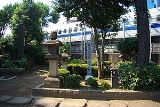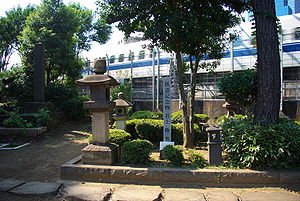
Inoue Masaru
Encyclopedia
Viscount
was the first `Director of Railways` in Japan and is known as the "father of the Japanese railways".
He was born into the Chōshū clan at Hagi, Yamaguchi
(Original son of Katsuyuki Inoue). He briefly was adopted into the Nomura family and became known as Nomura Yakichi, though later he was restored to the Inoue family.
Masaru Inoue was brought up as the son of a samurai belonging to the Chōshū fief. At 15, he entered the Nagasaki Naval Academy established by the Tokugawa government under the direction of a Dutch naval officer.
In 1863, Inoue and four friends from the Chōshū clan, stowed away on a vessel to the United Kingdom
. He studied civil engineering and mining at University College London
and returned to Japan in 1868. After working for the government as a technical officer supervising the mining industry, he was appointed Director of the Railway Board in 1871. Inoue played a leading role in Japan's railway planning and construction, including the construciton of the Nakasendo Railway, selection of the alternative route(Tokaido), and the proposals for future mainline railway networks.
After retirement from the government, Inoue founded Kisha Seizo Kaisha, the first locomotive manufacturer in Japan, becoming its first president in 1896. In 1909 he was appointed President of the Imperial Railway Association. He died on an illness in London
in 1910, during an official visit on behalf of the Ministry of Railways.
In 1891 Masaru Inoue founded Koiwai Farm with Yanosuke Iwasaki and Shin Onogi.
. To commemorate their stay in London, two scholarships, known as the Inoue Masaru Scholarships, are available each session under the University College London 1863 Japan Scholarships scheme to enable University College students to study at a Japanese University. The value of the scholarships are £2000 each.
 His tomb is in the triangular bit of land where the Yamanote Line
His tomb is in the triangular bit of land where the Yamanote Line
meets the Tōkaidō Shinkansen in Kita-Shinagawa.
Viscount
A viscount or viscountess is a member of the European nobility whose comital title ranks usually, as in the British peerage, above a baron, below an earl or a count .-Etymology:...
was the first `Director of Railways` in Japan and is known as the "father of the Japanese railways".
He was born into the Chōshū clan at Hagi, Yamaguchi
Hagi, Yamaguchi
is a city located in Yamaguchi, Japan and was incorporated as a city on July 1, 1932. Formerly part of Abu District.On March 6, 2005, the former city of Hagi merged with the towns of Susa and Tamagawa, and the villages of Asahi, Fukue, Kawakami and Mutsumi to form the new city of Hagi.Iwami Airport...
(Original son of Katsuyuki Inoue). He briefly was adopted into the Nomura family and became known as Nomura Yakichi, though later he was restored to the Inoue family.
Masaru Inoue was brought up as the son of a samurai belonging to the Chōshū fief. At 15, he entered the Nagasaki Naval Academy established by the Tokugawa government under the direction of a Dutch naval officer.
In 1863, Inoue and four friends from the Chōshū clan, stowed away on a vessel to the United Kingdom
United Kingdom
The United Kingdom of Great Britain and Northern IrelandIn the United Kingdom and Dependencies, other languages have been officially recognised as legitimate autochthonous languages under the European Charter for Regional or Minority Languages...
. He studied civil engineering and mining at University College London
University College London
University College London is a public research university located in London, United Kingdom and the oldest and largest constituent college of the federal University of London...
and returned to Japan in 1868. After working for the government as a technical officer supervising the mining industry, he was appointed Director of the Railway Board in 1871. Inoue played a leading role in Japan's railway planning and construction, including the construciton of the Nakasendo Railway, selection of the alternative route(Tokaido), and the proposals for future mainline railway networks.
After retirement from the government, Inoue founded Kisha Seizo Kaisha, the first locomotive manufacturer in Japan, becoming its first president in 1896. In 1909 he was appointed President of the Imperial Railway Association. He died on an illness in London
London
London is the capital city of :England and the :United Kingdom, the largest metropolitan area in the United Kingdom, and the largest urban zone in the European Union by most measures. Located on the River Thames, London has been a major settlement for two millennia, its history going back to its...
in 1910, during an official visit on behalf of the Ministry of Railways.
In 1891 Masaru Inoue founded Koiwai Farm with Yanosuke Iwasaki and Shin Onogi.
Honors
Inoue and his friends later came to be known as the Chōshū FiveChoshu Five
The were members of the Chōshū han of western Japan who studied in England from 1863 at University College London under the guidance of Professor Alexander William Williamson. It was still illegal to leave Japan when they left, as sakoku was still practically in force until the Meiji...
. To commemorate their stay in London, two scholarships, known as the Inoue Masaru Scholarships, are available each session under the University College London 1863 Japan Scholarships scheme to enable University College students to study at a Japanese University. The value of the scholarships are £2000 each.

Yamanote Line
The is commuter rail loop line in Tokyo, Japan, operated by East Japan Railway Company . It is one of Tokyo's busiest and most important lines, connecting most of Tokyo's major stations and urban centres, including the Yūrakuchō/Ginza area, Shibuya, Shinjuku, and Ikebukuro, with all but two of its...
meets the Tōkaidō Shinkansen in Kita-Shinagawa.
The other members of the Chōshū Five
- Itō ShunsukeIto HirobumiPrince was a samurai of Chōshū domain, Japanese statesman, four time Prime Minister of Japan , genrō and Resident-General of Korea. Itō was assassinated by An Jung-geun, a Korean nationalist who was against the annexation of Korea by the Japanese Empire...
(later Itō Hirobumii) - Inoue MontaInoue KaoruCount , GCMG was a member of the Meiji oligarchy during the Meiji period Empire of Japan. As one of the senior statesman in Japan during that period, he had a tremendous influence on the selection of the nation's leaders and formation of its policies.-Early years:...
(later Inoue Kaoru) - Yamao YōzōYamao YozoViscount was a Japanese samurai of the late Edo period who became an influential member of the Meiji era government of Japan.-Early life:Yamao was born in Akiu, a village in Chōshū domain , and had received the traditional training of a samurai at a private school in Edo...
who later studied engineering at the Andersonian Institute, GlasgowGlasgowGlasgow is the largest city in Scotland and third most populous in the United Kingdom. The city is situated on the River Clyde in the country's west central lowlands...
, 1866-68 while working at the shipyards by day - Endō KinsukeEndo Kinsukewas a Japanese statesman in the early Meiji period.Endō was born to a samurai family in Hagi, Chōshū Domain was a Japanese statesman in the early Meiji period.Endō was born to a samurai family in Hagi, Chōshū Domain was a Japanese statesman in the early Meiji period.Endō was born to a samurai...

